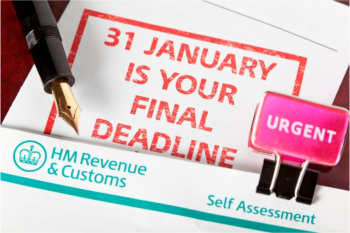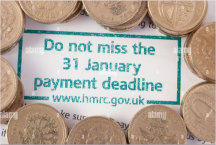
Filing a self-assessment tax return is a way to report your taxable income tax to HMRC if you are self-employed or have other sources of income. The deadline for filing your 2023/24 tax return is Friday 31 January 2025. If you are employed then your income tax is usually deducted from your wage by your employer. However, if you have received any income from a source other than PAYE, pension or interest on savings between 6 April 2023 and 5 April 2024 then you may need to complete a tax return.

You must submit a tax return if, in the last tax year any of the following applied:
- You are self employed as a ‘sole trader’ and earned more than £1,000 before deducting expenses.
- You are or were a partner in a business partnership
- You have a total taxable income of more than £125,000
- You had to pay capital gains tax when you sold or ‘disposed of’ something that increased in value, this can include the selling of shares, a second home or another asset.
- You or your partner received over £50,000 during the year and one of you claimed Child Benefit
- If you have received more than £12,570 in untaxed income e.g. through renting a property
- You have received foreign income
- You have income from savings, investments or dividends over £12,570 before tax
If the 31 January deadline for filing your tax return is missed then you will be charged a penalty of £100. If your tax return is more than three months late you could be charged an extra £10 a day up to 90 days (up to a maximum fine of £900).

HMRC can waive a late filing penalty if you have what they call a ‘reasonable excuse’. For instance, the death of your partner or another close relative, an unexpected stay in hospital, a serious life-threatening illness or issues with the HMRC online filing service. The ‘reasonable excuse’ must continue from the date of the missing filing until shortly before you actually file the return. HMRC expects you to file your tax return as soon as you are able to do so, within 14 days of the end of the special circumstance that caused you to late file.
If you have not sent an online tax return before, you will need to register for HMRC services at gov.uk beforehand. It is also important to make sure that you have all the documents to hand in order to enter the correct information. These may include:
- P60 showing your income and tax already paid.
- P45 if you have left a job within the tax year.
- P11D to detail any benefits or expenses.
- Details of interest on bank and building society accounts, dividends and any other income you have received.
Get into good habits by maintaining good records detailing your income and expenses and update them on a regular basis.
Consider putting money aside throughout the year so that you will have enough to pay your tax bill.
If you have not filed your 2023/24 tax return yet and would like help, please contact us as soon as possible and we would be happy to help.